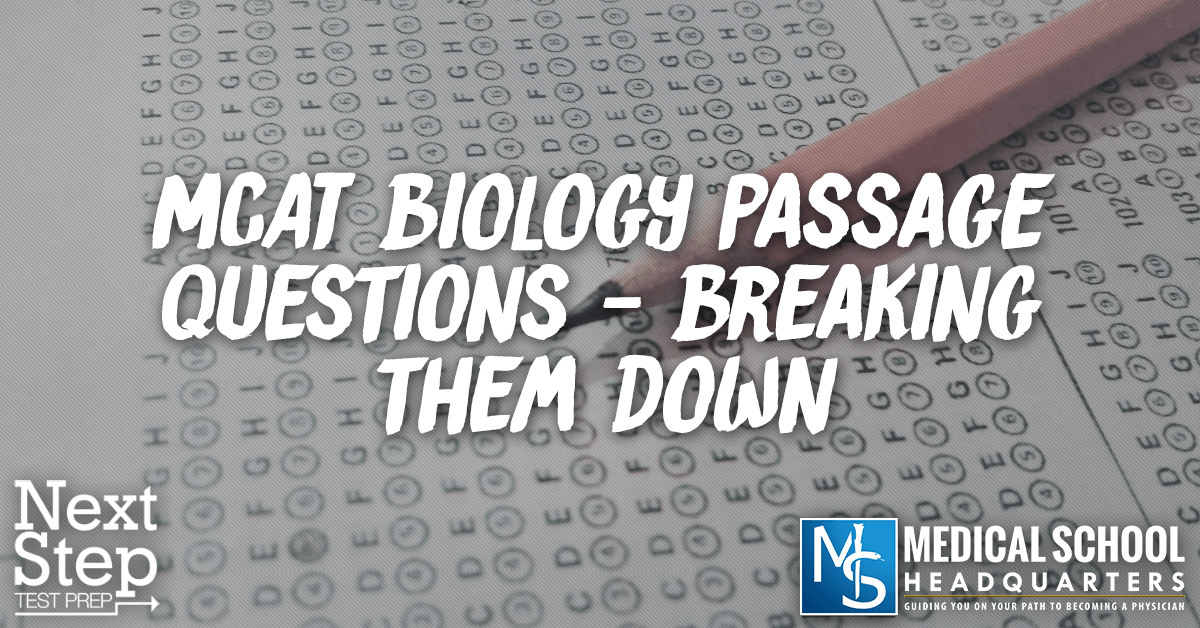
In today’s episode, we dig into some biology questions. Biology is the most important topic on the MCAT by far, as it shows up throughout the test in multiple different sections. Specifically, we’re looking at MCAT passage-based questions today.
Listen to this podcast episode with the player above, or keep reading for the highlights and takeaway points.
The passage itself is in the downloadable handout above. We’re going to jump right into the questions now:
Q: Monocytes in conjunction with epithelium-derived factors can act to facilitate which biological process?
This question expects you to know what monocytes are. Monocytes are white blood cells, so you can just jump right into (d) host immune response.
These other processes you don’t even need to know the question but just from your biology background, you should be able to recognize what they are.
Make sure you understand what the question asks first.
Before you start hunting through the passage, check out the answer choices real quick because there’s always one that is wrong, and you can eliminate one or two choices pretty quickly. And if there’s only one left, just pick it and go. Trust your basic sciences when you’re working through these MCAT passage-based questions.
[Related episode: Breaking Down an Organic Chemistry MCAT Passage.]
Q: After injury-induced cataract formation has begun, which of the following are least likely to be found in your monocytes?
Again, it’s another question about white blood cells. It’s a “least” question, so it’s something not associated with your white blood cells floating through the plasma.
(a) and (b): you don’t have to know a whole bunch about TGF beta just walking into the test. You would have to go back to the passage to see if (a) or (b) is relevant here. You should certainly know what tight junctions and cytokines are based on your outside biology knowledge.
Cytokines are cells used to communicate with each other and nearby cells. Basically, every cell in your body uses cytokines, so it’s likely to be found in monocytes.
Tight junctions hold cells tightly together, specifically making epithelial lining cells that make a barrier that’s difficult to penetrate through, such as in the blood-brain barrier. Monocytes don’t have that. This is the right answer since tight junctions would make no sense for white blood cells. Additionally, tight junctions would not be “in” a monocyte since a tight junction is “between” two cells.
[Related episode: Psych-Social MCAT Passage Breakdown.]
Any time an MCAT question gets confusing to you, read the question three times: Once to figure out what you’re solving for (just write it down in simple form). For the second time, just keep track of what new information was given to you. For the third time, read the question with your answer choice to make sure it all fits together.
Any time an MCAT question gets confusing to you, read the question three timesClick To Tweet
Lorem ipsum dolor sit amet, consectetur adipiscing elit
I just received my admission to XXXXX! This is unreal and almost feels like I am dreaming. I want to thank you for all of your help with my application. I cannot overstate how influential your guidance and insight have been with this result and I am eternally grateful for your support!
IM SO HAPPY!!!! THANK YOU SO MUCH FOR ALL YOUR HELP, IM INDEBTED TO YOU! Truly, thank you so much for all your help. Thank you doesnt do enough.
I want to take a few moments and thank you for all of your very instructive, kind and consistent feedback and support through my applications and it is your wishes, feedback, and most importantly your blessings that have landed me the acceptance!
I got into XXXXX this morning!!!! It still has not hit me that I will be a doctor now!! Thank you for all your help, your words and motivation have brought me to this point.
I wanted to once again express my heartfelt gratitude for your help in providing feedback during my secondary applications. Your guidance has been instrumental in my journey.
Just wanted to share my wonderful news! I received my first medical school acceptance! Thank you for all that you do for us Application Academy!!!
I am excited to tell you that I just got my third interview invite from XXXXX today! I can’t believe it. I didn’t even know if I was good enough to get one, let alone three – by mid-September. Thank you so much for all of your help and support up to this point; I would not be in this position without it!!
I wanted to thank you for helping me prepare for my XXXXX interview. Even in a 30-minute advising session, I learned so much from you. Thank you for believing in me, and here’s to another potential success story from one of your advisees!
I just received an acceptance with XXXXX! This is so exciting and such a huge relief and so nice to have one of our top choice schools! I also received an interview with XXXXX which brings the total up to 20 interviews! Thank so much, none of this would have been possible without you!

Join our newsletter to stay up to date
* By subscribing you agree to with our Privacy Policy and provide consent to receive updates from our company.
Resources
Advising Services
Podcasts & Youtube
Books
About
"*" indicates required fields